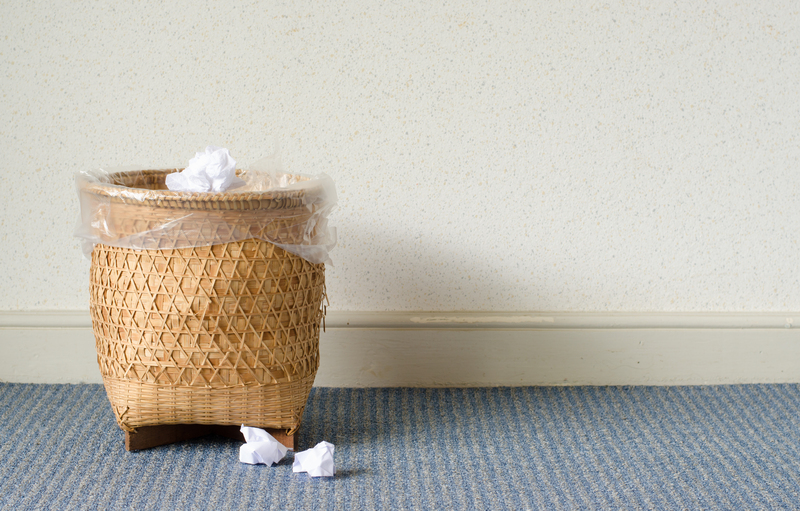Best Value Ideas for Bulky Waste Items Disposal
Large, heavy junk items can be a challenge to get rid of. Whether you're renovating, moving, decluttering, or just replacing old furniture and appliances, bulky waste items disposal can often seem overwhelming, costly, or both. However, with the right strategies and knowledge, you can responsibly and affordably dispose of large waste. This article explores the best value options for disposing of bulky waste items, ensuring environmental responsibility, legal compliance, and cost-effectiveness.

Understanding Bulky Waste
Bulky waste refers to items that are too large or heavy for regular household waste collection. Examples include furniture (sofas, beds, mattresses), white goods (fridges, washing machines), garden waste (trees, branches), and large electronics (TVs, computers). These items generally cannot be left with your weekly bin collection due to size, weight, and sometimes hazardous material components.
Why Proper Bulky Waste Disposal Matters
Disposing of bulky waste responsibly is important for several reasons:
- Environmental Protection: Many bulky items contain recyclable materials or hazardous substances. Proper disposal prevents pollution and conserves resources.
- Community Aesthetics: Dumped bulky waste can quickly ruin the look and feel of a neighborhood.
- Legal Compliance: Improper disposal can result in fines or legal action.
- Space Management: Clearing unnecessary bulky items frees up valuable space in your home or business.
Best Value Bulky Waste Disposal Ideas
If you're looking for affordable bulky item disposal solutions, several options are available. Here's a comprehensive guide to making the most economical and environmentally friendly choice.
1. Donate Usable Items
Often, what's clutter to one person is a treasure to another. Consider:
- Charities and Thrift Stores: Many organizations welcome furniture, electronics, and other large items in good condition. Some, like Goodwill or the Salvation Army, may even offer free collection services.
- Community Groups: Post your items on local Facebook groups, Freecycle, or Nextdoor. You'll often find someone willing to pick up items directly from your property, saving you time and money.
- Religious Organizations and Shelters: Contact local churches, shelters, or non-profits supporting new immigrants and low-income families; they often need furniture and household goods.
*Key Tip: Always call ahead to ensure your items meet the organization's acceptance criteria.
2. Sell for Extra Cash
Make bulky waste work for you! If your items have resale value, try online marketplaces such as:
- eBay: Best for unique, vintage, or high-value items.
- Craigslist and Facebook Marketplace: Fast, local transactions with large items often collected from your home.
- OfferUp and Letgo: Mobile apps ideal for quick, local sales.
*Take clear photos and provide honest descriptions. Price attractively to increase the likelihood of a quick pick-up.
3. Arrange for Local Council Collection
Many municipalities offer bulky waste collection services. Often, you need to book in advance and pay a nominal fee per item or load. Some councils offer free annual pickups for residents.
- Check Your Local Authority's Website: Rules, fees, availability, and accepted items all differ regionally.
- Prepare Items for Collection: Some councils require you to place bulky waste curbside or in a designated area.
- Follow Rules: Items like fridges or mattresses often have special collection guidelines due to materials like CFCs or flame retardants.
*Cost-effective and simple, council collections are a top-value choice for many homeowners.
4. Use Waste Transfer Stations
If you own or can borrow a suitable vehicle, you may transport bulky waste items directly to a local recycling center or waste transfer station. These facilities typically accept a wide range of large items.
- Low-Cost or Free Disposal: Residents can often dispose of certain items at no or minimal cost.
- Recycling Emphasis: Staff will direct you to appropriate drop-off points for electronics, metals, wood, and green waste, maximizing recycling rates.
- ID Required: Bring proof of residency; commercial loads may not be accepted.
5. Hire a Junk Removal Company
For maximum ease and peace of mind, professional bulky waste item removal services will do all the heavy lifting, loading, and disposal for you.
- Time-Efficient: Most companies offer same-day or next-day appointments.
- Licensed and Insured: Ensures compliance with local disposal laws and environmental standards.
- Transparent Pricing: Quotes are often based on volume, weight, or item type.
*Get several quotes to ensure you're getting best value on bulk waste removal. Ask about recycling policies for added eco-friendliness.
6. Rent a Skip or Dumpster
For large projects generating substantial bulky waste, renting a skip (dumpster) is often the most cost-effective large waste disposal method.
- Flexibility: Fill at your own pace over several days or weeks.
- Size Options: Choose a container suited to your project, from mini skips to roll-off dumpsters.
- Permitted Items: Check with provider about banned materials (e.g., hazardous waste, electronics).
- Permit May Be Needed: Required if placed on public land or a street.
7. Upcycle or Repurpose
Before disposal, consider if bulky waste can be transformed through upcycling or creative projects:
- Old doors, pallets, or wood: Convert into shelving, garden planters, or headboards.
- Worn-out sofas or beds: Reupholster or use frames for other DIY furniture.
- Electronics: Salvage parts for hobbyists or art projects.
*Not only do you reduce waste, you may also create something unique or valuable.
8. Community Bulky Waste Days
Watch for local "bulky waste drop-off days," when cities or neighborhoods organize free or low-cost days for residents to dispose of large waste. These special events help reduce illegal dumping and landfill use.
- Pre-registration: Sometimes required due to high demand.
- Accepted Items: Guidelines may limit appliances or hazardous items.
- Proof of Residency: Be prepared to show ID.
*This is among the best-value bulky item disposal options for those willing to transport items themselves.
How to Save Money on Bulky Waste Disposal
Disposing of bulky waste efficiently doesn't have to break the bank. Here's how to minimize your costs:
- Sort and Organize: Separate items into recyclables, donatables, and true waste. This may qualify items for free options and reduce disposal fees.
- Combine Loads With Neighbors: Split the cost of skip rental or junk removal for overlapping projects.
- Book in Advance: DIY collections and council services often offer discounts with advance booking.
- Look for Promotions: Some services offer seasonal discounts for specific bulky items (e.g., mattresses in spring, fridges in summer).
- Be Transparent: Accurately describe items for removal companies to avoid surprise surcharges.
Legal Considerations and Environmental Impact
As tempting as it might be to simply dump bulky waste on public land or near bins, it's illegal and environmentally damaging. Fly-tipping (illegal dumping) is a serious offense with heavy fines.
- Check Local Guidelines: Every municipality has specific laws about disposal of large waste and special items (e.g., electronics, hazardous components).
- Proper Documentation: Keep records of paid pickups, donations, or skip hire in case of disputes or accidental fly-tipping by third parties.
- Environmental Responsibility: Choose a provider committed to recycling or reusing wherever possible.
- WEEE Compliance: For electrical and electronic items, ensure compliance with Waste Electrical and Electronic Equipment (WEEE) regulations.
Remember: Illegal disposal of bulky waste not only risks fines and legal action--it also poses health, safety, and environmental hazards.

Frequently Asked Questions About Bulky Waste Disposal
What counts as a bulky waste item?
Bulky waste includes items that are too large, heavy, or awkward for standard bins: sofas, wardrobes, mattresses, white goods, bathtubs, carpets, large toys, garden equipment, etc.
Can bulky items be collected with regular household waste?
No. Bulky items must be handled through special collection services or disposed of at waste transfer facilities.
How do I find free bulky waste disposal options?
Ask your local council about free annual pickups, monitor for community collection days, or post reusable items on "freecycle" sites.
What happens to my bulky waste after it's collected?
Responsible disposal companies prioritize recycling and re-use. Items may be broken down for parts, recycled, or sent to energy recovery facilities. Some end up in landfills, but increasing regulations strive to reduce this.
What about hazardous bulky waste?
Special rules apply for items like refrigerators (which contain refrigerants), TVs and monitors (which contain heavy metals), or mattresses (which may contain chemicals). Always check guidelines or hire licensed disposal partners.
Conclusion: Choosing the Best Bulky Waste Disposal Solution For You
Disposing of bulky waste items doesn't have to be expensive or stressful. Start by assessing your items--can they be reused, sold, or donated? Take advantage of council collections and community events for the most cost-effective routes. For large projects or business needs, quotes from certified junk removal professionals or skip hire services may prove most convenient.
Whatever solution you choose, prioritize responsible, legal, and eco-friendly disposal. Not only do you help keep your community clean, you also contribute to sustainability and resource conservation.
With this guide, you're now equipped to find best value bulky waste items disposal options that suit your needs, budget, and the environment!
